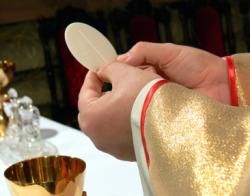
Being a missionary priest presents a few difficulties when it comes to filling out official forms. Not having a wife and/or a family, not having a mortgage or an income, not having an address that can be called “permanent” means we do not fit the usual profile on which many of these forms seem to be based.
I also have a few dilemmas when it comes to the category of occupation, especially on forms that I have to fill out when departing and arriving in New Zealand. There is never enough room to put “missionary priest” so I have to pick one or the other. I usually go with “priest”, though I often wonder what response that term is likely to evoke these days from the person who will deal with me in immigration. “Missionary” is also a bit of a disputed term these days creating for some, a negative image of interference in the lives and cultures of other people while for others it evokes a sense of solidarity and sharing between different parts of the church and the world.
There is another possibility that I have been tempted to enter on occasions but given the official nature of the forms, with all sorts of warnings about penalties and punishment for “false” declarations, I have never actually done it. That description is “Celebrant”. I don’t use it on official forms because it describes a segment of what I do rather than the whole of it but it is a very influential segment.  It is indeed a gift of priesthood that we are present at significant moments of celebration in people’s lives - weddings, baptisms, funerals, sickness and reconciliation. In my present situation here in Lower Hutt my occupation is primarily that of fundraising and Mission awareness. When I help out at one or other of our local parishes I find myself again in the role of celebrant. Coming in as a bit of a stranger, an outsider, I am even more acutely aware of both the privilege and the challenge of this role but also of the fact that it is a wonderful job description to have.
It is indeed a gift of priesthood that we are present at significant moments of celebration in people’s lives - weddings, baptisms, funerals, sickness and reconciliation. In my present situation here in Lower Hutt my occupation is primarily that of fundraising and Mission awareness. When I help out at one or other of our local parishes I find myself again in the role of celebrant. Coming in as a bit of a stranger, an outsider, I am even more acutely aware of both the privilege and the challenge of this role but also of the fact that it is a wonderful job description to have.
Then there is the fact that the “priest” is the one who presides when the Christian community celebrates Eucharist. We are essentially a celebrating community. In the Eucharist we touch base with the summit and source of our lives as Christians. While it represents such a small investment of time that it cannot be classed as an “occupation” this celebration reminds us that our faith is a total way of life. When we break bread in memory of Jesus we keep alive the dangerous memory of the crucified and risen one in a way that shapes and colours all our thinking and acting. Whatever we might write under the category of “occupation” everything we seek to do is influenced by what happens here. At least that is how it is meant to be.
Speaking of the meaning of full, active and conscious participation in the Eucharist that Vatican II called for Frank Anderson in his book Eucharist: Participating in the Mystery, suggests that it is not about an increased busyness on the part of many during the Eucharist but all those present “being swept up into the mystery of gratitude, self giving and joy that the ritual is meant to embody”. He adds in the preface of the book that when going to Mass on Sunday begins to lose its appeal for Catholics then to that degree do we begin to lose our sense of being Church. A crisis of faith is in some measure a crisis of identity.
So it seems to me that Anderson is on to something when he suggests that all the members of the Christian community (not just the “priest”) need to be able to identify themselves as “celebrants”. We are not people who are fulfilling an obligation, or keeping the rules or doing a religious duty when we gather for Eucharist. We are “celebrants”, people who are called to be swept up into the mystery of God revealed in the face of Jesus. I wonder if we really grasped this notion of celebration, really owned it as a description of who we are, how that might change the experience of what we do before, during and after Eucharist.
Fr Patrick O'Shea SSC lives at St Columbans Lower Hutt, New Zealand.
Read another reflection by Fr Patrick O'Shea: The bottom line of mission
or